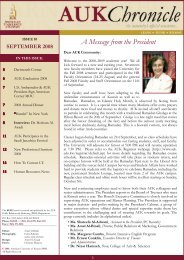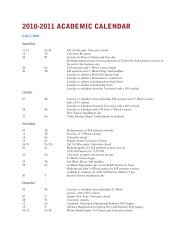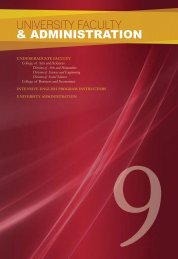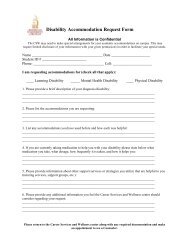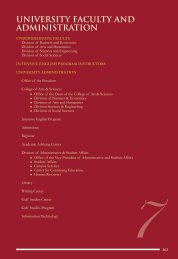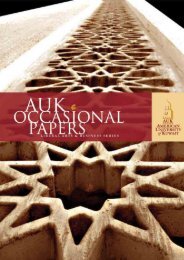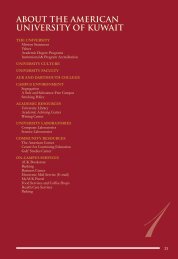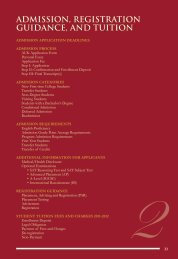interest in continuing to manipulate the accounting systemto produce a misleading, distorted, or downright fictionalportrayal of a business’s health and prospects.The extent to which management would use the profitimpact of a supply chain function in furthering thedysfunctional objective of CEO’s: to manipulate earningsis considered in this study. The message is clear: CEOsstill want value and in the supply chain function’s questto add value they may undermine the revenue aspects ofsome transactions.Following upon series of contacts between accountants,auditors and corporations, in-depth focus group discussionswere held on the causes of earnings manipulation, and itsnegative effects on financial, economic, social and culturaldevelopment of corporations in the Middle East. Moreover,what new games would accountants start to play tosupport earnings manipulation and earnings management?Reflecting upon the possibilities for strengthening theintolerance against corruption, it is essential to assessthe effectiveness of international efforts to support therule of law. Despite a proliferation of work in rule oflaw and anti-corruption in recent years, evaluations ofthe effectiveness of these activities are few. Recognizingthis gap in knowledge, the accounting profession in theMiddle East has begun taking stock of the effectivenessof rule of law promotion generally, and anti-corruptionspecifically. Business entrepreneurs in the Middle Eastare arguing that corruption can increase economicefficiency particularly when one sees very restrictiveregulations, bureaucratic laws and confiscatory measures.Corruption can reduce costs and thus increase efficiency.Accounting and peer pressureThe collapse of major U.S. corporations illustratesthe dangers of corporate ‘unaccountability’, and theinterrelationships that exist between big business,government and the professions whose job it is to holdthem to account. However, it has also raised a number ofspecific issues that hold lessons for the implementationand enforcement of anti-bribery legislation. At a time when30 countries are re-assessing their national measuresfor deterring bribery and corruption, so as to ensurecompliance with the Organization for Economic Co-operationand Development Anti-bribery Convention, then it isimportant to take the opportunity to review and learnfrom any lessons that were experienced in the U.S.The Organization for Economic Co-operation andDevelopment (OECD) is a unique forum where thegovernments of 30 market democracies work together toaddress the economic, social and governance challengesof globalization as well as to exploit its opportunities. TheOrganization provides a setting where governments cancompare policy experiences, seek answers to commonproblems, and identify good practice and co-ordinatedomestic and international policies. It is a forum where peerpressure can act as a powerful incentive to improve policyand which produces internationally-agreed instruments,decisions and recommendations in areas where multilateralagreement is necessary for individual countries to makeprogress in a globalised economy. Non-members areinvited to subscribe to these agreements and treaties.Evidence from around the world suggests thatMultinational Companies (MNCs), operating in a rangeof sectors, engage in bribery and corruption not onlyas a result of solicitation - but also as a choice strategy.The World Bank presents research, carried out in thetransitional states, and concludes that ‘bribery pays’ whenused either to secure large-scale procurement contracts,or to buy influence. The existence of powerful economicincentives, makes bribery all the more difficult to addressand underlines the need for rigorous enforcement of anti-briberylegislation. Concerns with corruption, over and above themoral and ethical discourse, include:• Impact on development and the poor: bribery andcorruption inhibit development as it is the poor whopay for the costs of bribes, either through higherprices, or lower quality services. Bribery also creates ademocratic deficit as key decisions affecting citizensare made away from the public arena for reasonsoutside the public interest;• Impact on markets: bribery and corruption distortscompetition• Integrity of public services: today’s privatisation andliberalisation policies are increasing the opportunitiesand incentives for bribery and corruption undermining47
48public confidence in the integrity of public services;• Impact on workers and whistleblowers: whistle-blowersprovide a mechanism for increasing the chance ofdetecting bribery and thus potentially provide a powerful toolfor deterring corruption. Whistleblowers need to beproperly protected both by national legislation and ata company level, through the establishment of appropriatedisclosure channels.Since 1977, the U.S. Foreign Corrupt Practices Act (FCPA)made it a criminal offence for USA companies – as wellas those foreign companies whose securities are listed inthe United States – to pay bribes to foreign governmentofficials. Moreover, the FCPA was adopted followingan SEC investigation in which over 400 USA companiesadmitted making questionable or illegal payments inexcess of £300 million to foreign government officials,politicians and political parties in an attempt to restorepublic confidence in the integrity of U.S. businessconduct. Other OECD countries, however, did not haveequivalent legislation. This raised concerns that the FCPAhad created an un-level playing field, as companies fallingoutside the scope of the FCPA could secure commercialadvantage, through the payment of bribes, in a way thatthose subject to the FCPA could not. This need to ‘levelthe playing field’ provided the motivation for the OECDConvention on Combating Bribery of Foreign PublicOfficials in International Business Transactions, whichcame into force in 1999 - over 20 years after the FCPA.Signatories, include all 30 OECD members, as well as 5non-members. The Convention requires signatories toenact national legislation that criminalizes the act of bribinga foreign public official. The FCPA represents 20 yearsexperience of implementing and enforcing anti-briberylegislation. It also provided the basic legislative frameworkfor the OECD Convention. As such, it potentially offersvaluable lessons for the implementation of the OECDConvention. The FCPA consists of two basic parts:• Anti-bribery provisions: which prohibit Americancompanies, citizens and residents from making illicitpayments to foreign officials to procure a commercialbenefit;• Accounting provisions: which requires public companiesto make and keep books and records that accuratelyreflect the transactions of the corporation and put inplace strict accounting controls aimed at uncoveringand deterring corruption. These were designed tooperate in tandem with the anti-bribery provisions.Violation of either the FCPA’s anti-bribery or accountingprovisions carries potential criminal and civil penalties.The FCPA is jointly enforced by the US Departmentof Justice and the Securities and Exchange Commission(SEC). Overall, however, there is means to assess theeffectiveness of the FCPA in deterring internationalbribery. Whilst to some extent the prosecution of casescan be assumed to send the signal to companies that itis ‘no longer business as usual’, it is impossible to knowthe frequency or level of bribes that have been paid despite theFCPA. Indeed, disappointingly perhaps, research on thebehavior of OECD MNCs in the transitional states foundthat USA companies were no less likely to engage in thepayment of procurement kickbacks than MNCs of otherOECD countries.CorruptionIf the cost of a corrupt act is lower than the cost of aproper act under an illegitimate and bureaucratic regimethen corruption is going to be pervasive. However,corruption is the cause of annoyance and misfortunedespite it having an efficiency enhancing value in restrictiveeconomies. If everything that virtuous is the hallmark ofprogress, corruption is its bane. Practices that one societycondemns as corrupt are considered harmless or evenappropriate in another cultural context. However, corruptacts are, in every definition, improper or illegitimate. Theproblem for social science consists of giving the term"improper" specific content and finally by what standardwould we know if a particular interaction is corrupt?Forms of corruption would include: bribery, extortion,fraud and collusion. Corruption could be individual,systemic and cultural. Individual corruption would entailthe benefits of corruption being enjoyed by a small groupof individuals. Systemic corruption on the other hand isinstitutionalized corruption. When individual corruptionand systemic corruption become pervasive – corruptionbecomes a culture. Systemic corruption ought to bea serious item that merits priority status in the globalagenda. Generally, corruption is a "zero-sum game"where through bribery, extortion, collusion or fraudsomeone wins at the expense of others and thus it mustbe curbed for the effective functioning of a global village.To be controlled effectively, systemic corruption willrequire a system’s approach strategy that simultaneouslyencompasses givers and takers. Only with the momentumthat could be achieved by a global commitment, (similarto the commitment for sustainable development), will itbe possible to make a difference on the subject.
- Page 2 and 3: About AUK Occasional Papers:The AUK
- Page 4 and 5: higher education is distinguished b
- Page 6 and 7: The Impact of a Glass Ceilingon Wom
- Page 8 and 9: more women a chance to flourish in
- Page 10 and 11: consider other factors such as the
- Page 12 and 13: academically unprepared…you must
- Page 14 and 15: EmotionalSignificant variations in
- Page 16 and 17: Advising and OrientationOther impor
- Page 18 and 19: etention. However, in addition, the
- Page 20 and 21: Hadi and Llabre (1998) assessed int
- Page 22 and 23: the event was encoded in parallel a
- Page 24 and 25: Public Health Impacts of Iraq’s 1
- Page 26 and 27: college work and have inadequate pr
- Page 28 and 29: memorization and repetition. This a
- Page 30 and 31: other in the pursuit of higher grad
- Page 32 and 33: for quality assurance, an organizat
- Page 34 and 35: RethinkingEntrepreneurship:Integrat
- Page 36 and 37: This type of training leads to enha
- Page 38 and 39: In short, Mount Allison students ha
- Page 40 and 41: Joplin, L. (1995). On defining expe
- Page 42 and 43: Figure 1. ExperientialEntrepreneurs
- Page 44 and 45: Kuwait - satellite television, cult
- Page 46 and 47: ReferencesAbt, V. & Seesholtz, M. (
- Page 50 and 51: Though corruption poses fundamental
- Page 52 and 53: A Cross-Cultural Modelof Innovation
- Page 54 and 55: were conceived as associations of c
- Page 56: others. In this case, confident pos
- Page 59 and 60: 58REFERENCESAmason, A. (1996) ‘Di
- Page 61 and 62: Shelton, C. and Darling, J. (2004)
- Page 63 and 64: 62• recycle natural resources use
- Page 65 and 66: 64Table Kuwait Fact Profile on Tran
- Page 67 and 68: Table Transportation and Associated
- Page 69 and 70: 68• Third, each mode of transport
- Page 71 and 72: 70• Prepare a Bank Group transpor
- Page 73 and 74: 7219. Stratford,A. (1974). Airports
- Page 75 and 76: 74may be developed in a safe and or
- Page 77 and 78: 28. Tables - 1 Environmental Manage
- Page 79 and 80: 6) EnvironmentalAwarenessNo baselin
- Page 81 and 82: 80Iran, the US, and HighlyEnriched
- Page 83 and 84: 82since the 1951 nationalization of
- Page 85 and 86: 8450% of the population is astonish
- Page 87 and 88: 86The US also approved the Shah’s
- Page 89 and 90: 88George W. Bush’s State of the U
- Page 91 and 92: 90when Iran could not keep up with
- Page 93 and 94: 92rich states, the decrease of natu
- Page 95 and 96: 94indigenous training. Specifically
- Page 97 and 98: 96It is important to note that Russ
- Page 99 and 100:
Table 1: Nuclear Powered States and
- Page 101 and 102:
100Foucault, Michel. “What are th
- Page 103 and 104:
102Ramazani, Rouhollah K. “Iran
- Page 105 and 106:
104My SCORE, OurMATCH: CommunityPar
- Page 107 and 108:
106with a mate while he does mechan
- Page 109 and 110:
108dimensions of life including for
- Page 111 and 112:
correlated to the commitment and on
- Page 113 and 114:
REFERENCESBryce, J, Frigo, T, McKen
- Page 115 and 116:
GDP $21,300, GDP growth rate 6.8%,
- Page 117 and 118:
• Less than half of the people su
- Page 119 and 120:
118TABLE 4: # 1 Gulf Country in Eco
- Page 121 and 122:
120• More men than women indicate
- Page 123 and 124:
TABLE 8: Why? X GenderGENDERMALE FE
- Page 125 and 126:
TABLE 11: Success in improving Livi
- Page 127 and 128:
TABLE 14: Success in preserving Cul
- Page 129 and 130:
• Gender wise, more men felt that
- Page 131 and 132:
TABLE 18: How foreign workers are t
- Page 133 and 134:
• In terms of the preference of e
- Page 135 and 136:
TABLE 24: Should Oil be the Basis f
- Page 137 and 138:
F i gur e 18: S hould K uwa it J oi
- Page 139 and 140:
13811. What do you think about the
- Page 141 and 142:
140Conditions of Kuwaiti Dependence
- Page 143 and 144:
1422) if the alien has no means of
- Page 145 and 146:
144offered Mubarak recognition as a
- Page 147 and 148:
146labor regulations and enforcemen
- Page 149 and 150:
148intensifying suspicion and hosti
- Page 151 and 152:
150Commission on Freedom of the Pre
- Page 153 and 154:
Even the viceroy of India, Lord Cur
- Page 155:
Christine PiconeAustralian College



